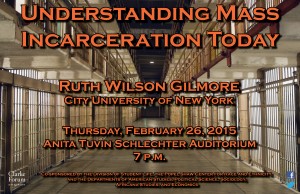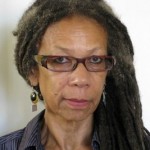 City University of New York
City University of New York
Understanding Mass Incarceration Today
Thursday, February 26, 2015
Anita Tuvin Schlechter Auditorium, 7 p.m.
A two year decline in the number of people locked in prisons and jails prompted a so-called “bipartisan consensus” to declare victory in the fight to end mass incarceration. Year 2013 reversed the trend; how, why, and to what end?
This program is sponsored by the Clarke Forum for Contemporary Issues and co-sponsored by the Division of Student Life, the Popel Shaw Center for Race and Ethnicity, and the Departments of American Studies, Political Science, Sociology, Africana Studies, and Economics.
Biography (provided by the speaker)
 Ruth Wilson Gilmore is professor of earth & environmental sciences, and American studies, and director of the Center for Place, Culture, and Politics, at the Graduate Center of the City University of New York. She received a B.A. and M.F.A. in dramatic literature and criticism from Yale, and a Ph.D. in geography from Rutgers, the State University of New Jersey. She has many publications, invited lectureships, honors, and awards. Her prize-winning book is Golden Gulag: Prisons, Surplus, Crisis, and Opposition in Globalizing California, published in 2007. In a front-page review, the San Francisco Chronicle said “Now, if you want to understand why progressive California leads the Western world with its regressive system of punishment, Gilmore’s “Golden Gulag” is the first must-read book of the 21st century”.
Ruth Wilson Gilmore is professor of earth & environmental sciences, and American studies, and director of the Center for Place, Culture, and Politics, at the Graduate Center of the City University of New York. She received a B.A. and M.F.A. in dramatic literature and criticism from Yale, and a Ph.D. in geography from Rutgers, the State University of New Jersey. She has many publications, invited lectureships, honors, and awards. Her prize-winning book is Golden Gulag: Prisons, Surplus, Crisis, and Opposition in Globalizing California, published in 2007. In a front-page review, the San Francisco Chronicle said “Now, if you want to understand why progressive California leads the Western world with its regressive system of punishment, Gilmore’s “Golden Gulag” is the first must-read book of the 21st century”.
Awards include a grant from the National Endowment for the Arts, a Soros Justice Senior Fellowship, the James Blaut Award for Critical Geography, the Ralph Santiago Abascal Award for Economic and Environmental Justice, and the American Studies Association’s Lora Romero Best Book Prize, the ASA’s Angela Y. Davis Award for Public Scholarship, and the Harold Rose Award for Anti-Racist Research and Activism from the American Association of Geographers. She has been recognized by many community justice organizations as well as: the California State Senate; the Los Angeles (California) Board of Supervisors; and the State of Connecticut. Gilmore is a board member of the Economic Roundtable; Theoretical Criminology; and Women’s Studies Quarterly. A co-founder of several grassroots social justice groups, and member of several scholarly societies, she is a past president of the Central California Environmental Justice Network, and of the American Studies Association.
